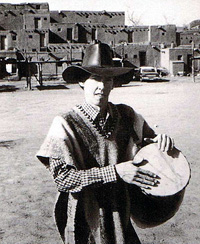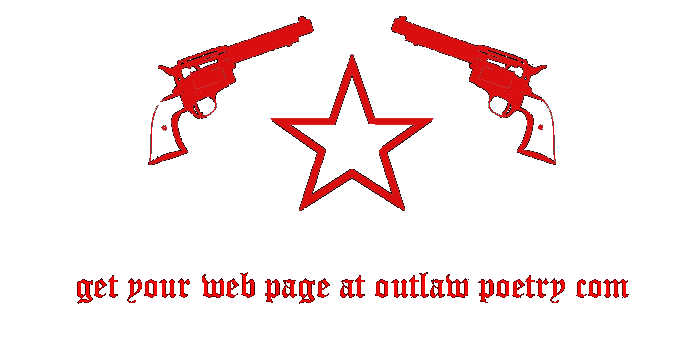Tony Moffeit
Listen to give me the night (2:51)
TONY MOFFEIT | AMERICAN BLUES OUTLAW POETRY ANARCHIC DREAM
by Todd Moore
 Tony Moffeit and I founded the Outlaw Poetry Movement in America in 2004, partly as a reaction to the kind of tame poetry generated by writing programs, academia, and the prize system which is good old boy, incestuous, and corrupt. However, Tony and I have been good friends since 1983 when I published one of his early chapbooks entitled OUTLAW BLUES. But Outlaw in his work predates the early eighties because of his abiding interest in rockabilly, Delta Blues, Sun Records Country, and Hank Williams. Tony brought pop music culture to the poetry table when most everyone else was too cultured, too sophisticated to care.
Tony Moffeit and I founded the Outlaw Poetry Movement in America in 2004, partly as a reaction to the kind of tame poetry generated by writing programs, academia, and the prize system which is good old boy, incestuous, and corrupt. However, Tony and I have been good friends since 1983 when I published one of his early chapbooks entitled OUTLAW BLUES. But Outlaw in his work predates the early eighties because of his abiding interest in rockabilly, Delta Blues, Sun Records Country, and Hank Williams. Tony brought pop music culture to the poetry table when most everyone else was too cultured, too sophisticated to care.
When I say Outlaw Poet, I don’t mean to suggest that Tony Moffeit robs banks or is involved in a criminal organization. What I do mean to say is that Moffeit’s poetry bucks the trend of safe writing in America. It doesn’t come out of the John Ashbery East.
It isn’t affiliated with the New York School, Black Mountain, or Language Poetry. And, in the West, it has nothing in common with the Boulder Beats or Post Wannabe Bukowski. Moffeit, at times, has been called Beat but he really has nothing in common with the Beats. He shows no interest in Eastern Religion, doesn’t write like or in the tradition of Allen Ginsberg, and is not even connected to the Baby Beats.
Moffeit’s predecessors are really Jack Micheline, Ray Bremser , and d. a. levy. These poets were all marginal Beat poets who had more interest in street poetry, drugs, crime, and going it alone than in the more public scene of Kerouac and Ginsberg. These three poets are really closer to what the Outlaw Poets are all about.
As an Outlaw Poet, Tony Moffeit is more interested in Billy the Kid rather than the Dalai Lama. What he is searching for in many of his books and chapbooks is the dark American underbelly, the shadowy place where all creative energy originates. His sense of Lorca’s Duende is visible in his poetry and blues performances. When he performs Luminous Animal, the room begins to shake.
For Moffeit, the metaphor of Billy the Kid is really central to his most important work. The Kid, who was a real life Western gunman, is important to both Moffeit’s continuing long poem about the Kid and to Moffeit’s poetic stance which stresses a kind of existential attitude about being a poet in America post nine eleven. Because if you are a poet, if you are one of the last of the authentic American voices, if you are a storyteller in the wreckage of the human, then you are making an existential choice about the breath and the way.
This passage from Outlaw Blues probably best exemplifies what Tony Moffeit is all about.
…tonight i sing a blues song for the outlaws the renegades the desperados who drift under endless skies america your clouds are my songs your rain is my voice your hail is my blues.
Tony Moffeit has always lived at the edge of his nervous system. He howls his poems in performance and he writes poetry doing 80 on Route 25. His is a high speed america and his dreams are energized with Duende and blood.

Tony Moffeit is the blues poet and blues singer from Pueblo, Colorado, who was the winner of the prestigious Jack Kerouac Award from Cherry Valley Editions for his volume of poetry, PUEBLO BLUES, now rare and out-of-print. He is also the author of two other volumes from Cherry Valley Editions: LUMINOUS ANIMAL (New Orleans poems) and NEON PEPPERS (Hank Williams poems).
His 1995 volume, POETRY IS DANGEROUS, THE POET IS AN OUTLAW, from Floating Island Publications, introduced outlaw essays and some early roots of the philosophy of Outlaw Poetry. Moffeit and poet Todd Moore founded the Outlaw Poetry Movement from 2004 to the present through poems, essays, reviews, performances, and manifestos.
Moffeit is the author of twenty additional poetry volumes, including TONY MOFFEIT: GREATEST HITS from Pudding House Publications (2004). He has been the recipient of a National Endowment for the Arts creative writing fellowship in poetry and was the recipient of the Thomas Hornsby Ferril Poetry Prize. Moffeit performs his original blues songs and poems with guitarist Rick Terlep, often accompanying himself on conga drum. Rick Terlep is a guitarist from Pueblo, Colorado, who has a blues band called Little Ricky and the Roosters. Moffeit and Terlep have a CD due out in January, 2008, titled “Outlaw Blues Revolution” from DigiVintage Records.

